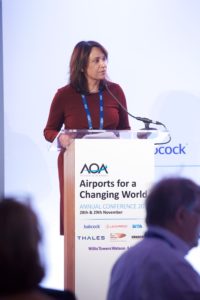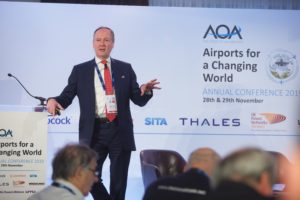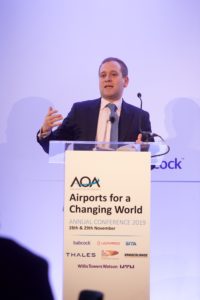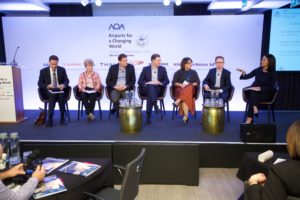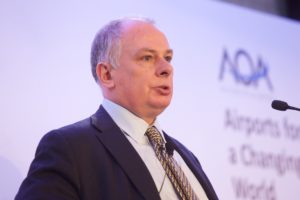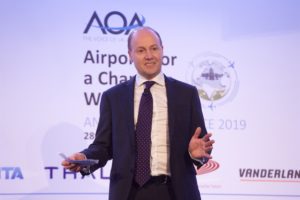Day 1: Responding to political, social and environmental challenges in the future
The Baroness Ruby McGregor-Smith CBE, Chair, Airport Operators Association welcomed attendees from what she described as “a really diverse and exciting industry” and noted that it had been “a challenging year” with the collapse of Thomas Cook and fluctuating passenger numbers affected by uncertainty over Brexit. Thanking conference sponsors and exhibitors, she promised “a great array of speakers”.
Karen Dee, Chief Executive, Airport Operators Association said that the new Chair had brought a wealth of business and board experience to the AOA and had already made an impact since starting in the role in September. Noting that the AOA had, a week previously, set out its views on what the next Government should do for aviation, she highlighted the potential for further sustainable growth at all airports and improved connectivity. She said the AOA believed that with the industry’s commitment and the right Government support net zero emissions were within reach for UK aviation. Much had already been achieved through Sustainable Aviation, but now the industry needed to move “further and faster”. There was an opportunity to build a sustainable fuels industry that could make the UK a world leader in the field. New aircraft and engine technology and upgrading UK airspace to make it fit for purpose would help to cut both emissions and noise. Delivering all of this would require very clear Government leadership, a more joined-up approach within Government and a partnership between Government and industry.
Joined by former Transport Ministers standing down at a fractious time
The first discussion of the day saw former Transport Secretary, Sir Patrick McLoughlin, and former Aviation Minister, Jim Fitzpatrick, share their experiences of the aviation sector and their time in government.
Sir Patrick noted that it was more than 30 years since he was first appointed a junior Minister at the Department for Transport and involved in discussions about additional airport capacity in the South East. As Secretary of State for Transport from 2012 to 2016 he had announced the Davies Commission. In his view, Heathrow was “a jewel for UK PLC” and it was in the national interest that expansion should go ahead. He also believed that HS2 was “an absolutely essential project for the long-term future of this country”. Sir Patrick said that in the past successive governments had failed to invest sufficiently in infrastructure, but he now believed that whichever party won the election there would be more infrastructure investment and that was something to be welcomed.
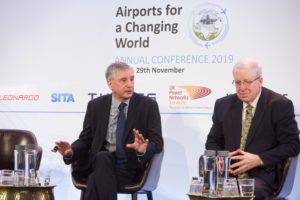
Sir Patrick McLoughlin and Jim Fitzpatrick discuss the past, present and future of the aviation sector.
Mr Fitzpatrick, Aviation Minister from 2007 to 2009, whose East London constituency included London City Airport, said he had been one of the aviation industry’s most sympathetic and supportive MPs. However, he said that the industry needed to do a much better job in responding to hostility from Extinction Rebellion and the environmental lobby – declaring: “Right across the board you have lost the argument and you continue to lose the argument. He suggested that Sustainable Aviation should be “your first line of attack and your first line of defence”.
He forecast that, were a Labour Government to be elected, “I think you can expect hostility”, reflecting in part the long-standing opposition to Heathrow expansion by Shadow Chancellor, John McDonnell. He said he thought that the aviation industry could expect more problems from a Labour than a Conservative Government. His expectation was that Heathrow expansion would go ahead under a Conservative Government, but he was “not entirely sure” about a Labour Government. In the event that Brexit went ahead, he said that the UK’s aviation industry would have an opportunity to underline that only it could provide the links with the rest of the world that the economy would need.
The response from a diverse set of airports
Following the politicians were a number of CEOs from the UK’s airports.
Karen Smart, Managing Director, East Midlands Airport, noted that East Midlands is the largest primarily freight airport in the UK and was also the country’s first carbon neutral airport. She said that “the market is really tough out there, particularly for regional airports” and called on the Government to introduce policies that would support airports to make the best use of their existing capacity. She said the Government could also consider extending the principle of Public Service Obligation subsidies for new passenger routes to include new freight links.
Graham Keddie, Managing Director, Belfast International Airport, said that Belfast International and the other Northern Ireland airports are facing “aggressive state-owned competition” from airports in the Republic of Ireland where there is no Air Passenger Duty and that was skewing competition. He said that action to help with Air Passenger Duty would be at the top of his list of policy asks to the UK Government. He also noted that Northern Ireland had been without a devolved government for three years, which had meant that local infrastructure issues were not being properly assessed. Northern Ireland’s airports were also having to deal with huge continuing uncertainty over what Brexit would mean for border checks.
Andrew Bell, Chief Executive, Regional & City Airports Group said that what regional airports need from Government more than anything else is certainty and he said that the current lack of certainty was putting a brake on investment. There also needed to be a recognition that some airports only have a limited ability to generate revenue and there needed to be a recognition from regulators that requirements should be matched to resources. He said that, compared to a year ago, Regional & City Airports was now totally focussed on environmental concerns and recognised that it needed to take a leadership position that would enable its airports to “leapfrog ahead”.
Delivering the national programme of airspace change
Mark Swan, Head of the Airspace Change Organising Group (ACOG) said that ACOG had been set up as an independent body by the Department for Transport and the Civil Aviation Authority to deliver the national programme of airspace change. He said that, with demand for air travel continuing to increase and delays al
ready common in the busy summer season, a programme to upgrade airspace was essential. ACOG’s aim was
to help to deliver safe, simple and efficient airspace that would both deal with delays and reduce carbon emissions. Airspace change alone could deliver a reduction of up to 14% in emissions by 2050.
He said that ACOG would seek to manage and facilitate compromises. Though its decisions would not please everyone, it would be open and transparent, fair and impartial, rigorous and disciplined and benefits led. His aim was to drive forward a programme of work that could begin to deliver tangible benefits for some airports within two years. ACOG would also be developing a strategic national narrative about airspace change that would help airports to explain their plans to local communities within the context of a broader picture.
The New Independent Commission on Noise
Robert Light, Head Commissioner, Independent Commission on Civil Aviation Noise (ICCAN) said he wanted to make the UK the world leader at managing aviation noise and hoped that ICCAN could be the agent for change that makes that happen. He said that the Commission’s independence would enable it to challenge accepted practices, to ask questions and to ensure that there was a real focus on how to move the noise agenda forward. In the immediate future ICCANN would publish a report on attitudes to aviation noise later in December, aim to publish a toolkit for how airports could best carry out local consultations and a report on noise metrics in April 2020 and a report on regulation in summer 2020.
ICCAN’s view was that the relationships between airports and their local communities would be crucial and that not enough had yet been done to improve those relationships, though Mr Light said he thought that airports were trying to do the right thing and that was really positive. He suggested that airports should reconsider their attitude towards noise complaints and move to a position where airports viewed complaints as a mechanism that helped them to improve.
Mr Light said his view was that the industry could grow and reduce noise, but it needed to recognise that an increase in the frequency of flights was something that worried people and should be addressed – for example by offering predictable periods of respite. On the health impacts of aviation noise, he said there was not enough reliable evidence. The Commission was working with academics to identify the gaps in knowledge and how they could best be filled.
Disruption: adapting to a changing market
In a panel discussion on future opportunities and challenges in the aviation sector, a number of industry leaders debated everything from drones to e-vehicles and market pressures.
Stewart Wingate, Chief Executive Officer, Gatwick Airport said that Gatwick had experienced a decade of change since he joined the airport as CEO in 2009, with passenger numbers up from 31 million to nearly 47 million and the number of direct long-haul routes up from 30 to 65. Last year’s incidents involving drones, which briefly closed Gatwick, had been a test of the airport’s commitment to passenger safety and security. Subsequently Gatwick had introduced at a breakneck pace the most state-of-the-art anti-drone technology. The airport was also proud of its long-standing focus on sustainability and its tariffs encouraging the use of quieter aircraft. It believed that it had “probably the quietest, cleanest fleets of any airport on the planet”. Looking ahead, Gatwick hoped that using its northern runway would enable it to increase passenger numbers to 70 million by 2030 and to make further progress on both sustainability and passenger convenience.
Derek Provan, Chief Executive Officer, AGS Airports said that UK airports had had to adopt to a changing marketplace, with the increasing dominance of low-cost carriers, adding: “We can feel that pressure”. Looking ahead, he said he expected to see more consolidation in the airline market. Mr Provan said that AGS Airports had a strong focus on the impact of climate change which had gained a much higher profile in the last six to eight months. He said that the aviation industry could and should do a much better job of collaborating to deliver its messages on carbon emissions.
Fredrik Kampfe, Director of Industry Affairs, Swedish Aviation Industry Group said that Sweden was “Greta country” and the country that had popularised the concept of “flight shaming” in relation to aviation carbon emissions. This year there had been a 9% drop in domestic traffic and a 1.9% fall in international traffic, due to a combination of factors, including flight shaming and a flight tax. Sweden had the goal of getting to net zero and fossil-free by 2045. The aviation industry had developed a road map to achieve fossil-free domestic flights by 2030 and all flights by 2045. A Swedish company hoped to be producing electric aircraft for regional flights by 2025. Now the Swedish aviation industry was calling for Government action to support its fossil-free plans, including the creation of a fund to encourage innovation.
Stacey Peel, Associate Director, Arup leads Arup’s strategic aviation security business globally and its aviation advisory team. She said that, while further developments in passenger security and cyber security would have a significant impact, there was no doubt that the carbon debate and the need for a massive step change in response would dominate aviation thinking. Airports would need to design and build their assets with 2050 in mind, taking into account, for example, likely requirements for battery recharge stations. Governments would need to ensure that the regulatory environment was enabling, not inhibiting and the UK Government should recognise that there was an opportunity for the UK aviation industry to be a global leader.
The Latest from ACI Europe on slots
Morgan Foulkes, Deputy Director General, ACI Europe said that ACI Europe had commissioned an independent assessment of slot regulation, which would be published shortly, together with a new ACI Europe position paper. The European Commission had also commissioned a new study by consultants, Steer Davies Gleave, which should be finalised by spring 2020, after which the Commission would decide on next steps.
ACI Europe’s view was that the regulation, which dates back to 1993, needs to adapt to take changing circumstances into account, particularly the increasing congestion at many of Europe’s airports. There was a need to encourage slot mobility and discourage waste of capacity at the most congested airports. There should also be new rules for cases where, as a result of capacity increases, a large number of new slots become available, with an increase in the number of slots allocated to new entrants to allow them to establish a meaningful presence.
Climate mitigation and resilience: adapting to a changing climate
Professor Jason Lowe, Head of Climate Services, Met Office presented a scene-setter for the panel discussion on climate change. He said that the Met Office expects the UK to have a greater chance of warmer, wetter winters and hotter, drier summers. All areas are expected to experience warming, but especially the South and South East. Large reductions in snow are expected across
the UK. He said that these changes in the climate between now and 2050 could have impacts on airport ground operations, passengers and staff, logistical deliveries and flights. Hotter extreme temperatures might impact on aircraft take offs and cause disruption in travel to and from the airport and to logistics supplies. The health and comfort of staff and passengers at UK airports could be affected. He said that the aim of the Met Office was to “help you make better decisions to stay safe and thrive”.
Andrew Cowan, Chief Executive, Manchester Airport said that all airport operators recognise just how important climate change is. A huge amount was going on in the sector, which had already detached growth in aviation from growth in carbon emissions. It was important that the UK Government did not introduce demand-based limits and continued to support an international approach to dealing with the issue. The aviation industry was already delivering but needed to do more and to be clearer about its narrative, being on the front foot as opposed to being defensive. He warned: “Unless we get the narrative right, then the general public and sentiment will turn against this industry”.
Simon McNamara, UK and Ireland Area Manager, IATA said the aviation industry had failed to communicate the good work that it had done and what it was delivering. It needed to be more effective in telling the story of improved technology, more efficient operations, improving infrastructure and using market-based measures. Because electric aircraft were unlikely to be usable for long-haul routes, at least in the short term, more needed to be done to scale up research and development of sustainable aviation fuels.
Neville Hargreaves, Vice President – Waste to Fuels, Velocys is responsible for the waste to fuels business of Velocys, including a project to take half a million tonnes of municipal and commercial solid waste, otherwise destined for landfill or incineration, and use it to make clean sustainable jet fuel. He said that Velocys is working with BA and Shell on plans for Europe’s first waste-fuel plant near Immingham. They had applied for planning permission and hope to get final approval in 2021, with the first fuel becoming available in 2022. Getting the supply built would be a great opportunity for the UK, but it would require other investors and the support of Government. He concluded: “We can change the narrative, but we have to walk the walk as well”.
Ian Smyth, Director, UK Power Networks Services said that the resilience of airport electricity systems has a direct impact on the passenger experience. He said that it was really easy to reconfigure and adapt electricity systems as airports changed and that optimising electricity systems could lead to significant cost reductions. He also emphasised that electric vehicle technology is developing fast and coming down in cost.
Professor Penny Endersby, Chief Executive, Met Office was appointed the first female Chief Executive at the Met Office in 2018 and is the UK’s national representative at the World Meteorological Office. She said that awareness of climate change is growing across the population and across all industries, though there are many aspects of climate change which are only just beginning to be understood. She also emphasised that the quality of Met Office forecasting over long time periods is steadily improving.
Day 2: Investing in a globally connected United Kingdom
Dr Adam Marshall, Director General, British Chamber of Commerce opened the second day of the conference with an outlook
for the UK economy into 2020. He said that the Chamber’s most recent quarterly economic survey painted a picture of stagnation. Brexit uncertainty had had a real impact on business investment decisions, with a lot of people waiting for clarity before they move ahead. Meanwhile there was a lack of forward visibility on orders. Businesses were also dismayed that the economy had not been more front and centre in the General Election discussion, although the fact that “we are finally talking about infrastructure again is one silver lining against many a cloud”.
He said that the Chamber was a long-standing supporter of the aviation industry which supplies the connections that businesses need for trade. Support for the third runway at Heathrow was “strong and deep” and the Chamber wanted to see uncertainty dispelled over both Heathrow expansion and HS2. The Chamber would also fight the industry’s corner on surface access to airports. He said the Chamber was keen to share the story of what the industry was doing to decarbonise, where he saw the aviation sector as “a great innovator”; telling that story was going to be “hugely important”. Dr Marshall said that in the Chamber’s view it was “not a great idea” to seek to restrain aviation growth in the UK.
Connecting the UK to the Global Economy
Following on from Dr Marshall’s presentation was a panel discussion to expand on the issue of the UK’s global competitiveness and how it can enhance its connectivity to better reach emerging markets and open up new export opportunities.
John Holland-Kaye, Chief Executive Officer, Heathrow Airport said it should be shocking for any UK politician to see Heathrow dropping down the charts for direct connectivity, compared to its European rivals, because of capacity constraints. With a new runway, Heathrow would see more direct flights to regional airports and to secondary cities in the US, China and India. IAG would be able to grow its flights from Heathrow and other airlines would be able to compete. The result would be more choice for passengers and lower fares. Mr Holland-Kaye said it was right that the UK aviation industry should take a lead on carbon emissions and he urged the Government to help the industry to scale up the production of sustainable fuels.
Deb Bowen-Rees, Chief Executive Officer, Cardiff Airport said it was important that the Government should understand that airports of all sizes play a really important role in supporting the UK economy. Global connectivity was a critical enabler of regional development and a new direct route could have a transformational effect. She cited the example of the introduction in 2018 of regular flights by Qatar Airways from Cardiff to Doha, with its multiple onward connections. Ms Bowen-Rees urged the Government to develop an aviation strategy that recognised the disproportionate impact and costs of safety and security regulation for smaller airports. Looking ahead she said that Cardiff hopes to see new direct routes to New York and Orlando.
Morgan Foulkes, Deputy Director General, ACI Europe said that European airports had seen strong growth in passenger numbers and connectivity over most of the past decade, but 2019 had been a bit different, with passenger numbers going down and only small increases in connectivity. Airlines had become more risk-averse because of the uncertain economic outlook. Referring to ACI Europe’s connectivity league table, he said that the top three hub airports today are Frankfurt, Amsterdam and Paris, with Heathrow now in fourth place (compared to second place in 2009) because of capacity limitations.
Rosemary Gallant, Minister Counselor for Commercial Affairs, US Embassy drew attention to the very close aviation ties between the UK and the US, with over 140 direct flights a day and five million UK citizens visiting the US last year and four million Americans visiting the UK. She reminded the conference that a year ago the US and the UK had signed an Open Skies agreement, providing a degree of certainty for the aviation sector not shared by a lot of other industries. She said that she was very confident that the important aviation ties between the two countries would continue to grow, whatever the political environment.
Neil Slaven, UK Country Director, EasyJet said that EasyJet now operates from 11 bases in the UK, providing both domestic and European connectivity. Whatever happens on Brexit, Europe would continue to be our biggest trading partner and the importance of those links to primary airports around Europe, driving airport passenger volumes, should not be under-estimated. EasyJet was a very big part of that and was “very much the UK’s national airline”. Mr Slaven said that EasyJet wants to be a first mover on sustainability and was very proud of its recent announcement that it would be the first major airline to offset the carbon emissions from the fuel used for every single flight. He said that the decision would have zero impact on passenger fares because the airline had decided that it would absorb the cost.
Richard Jewsbury, Divisional Vice President UK, Emirates said that Emirates had now had a presence in the UK for 32 years, operating to eight gateways to the UK and providing 10,000 seats a day, half in the London area and half in the regions. He said that Emirates had opened up routes that acted as a profit multiplier for local businesses and were important for both freight and inbound tourism. He stressed the criticality of airspace modernisation and noted that long-haul Air Passenger Duty was disproportionately expensive to the UK and continues to drive business to Europe and elsewhere.
Infrastructure Financing
The last panel session of the conference focused on infrastructure investment and the relationship between the markets, investors and big infrastructure like airports.
Nigel Addison Smith, Director, Nyras advises airlines and airports on strategy and financing; he set the scene for the discussion with a brief presentation. He said that, against a background of low economic growth, 2019 had not been an easy year for the aviation sector, with the demise of Thomas Cook having an impact on regional airports. Nevertheless, he was optimistic about the future, pointing to IATA predictions of strong UK traffic growth over the coming years. From an airport perspective, technological developments were crucial and would enable airports “to do amazing things in the years to come”.
David Stanton, Managing Director, Ontario Airports Investments is Managing Director of the subsidiary of Ontario Teachers’ Pension Plan that manages and oversees its airport investments across Europe, including Birmingham, Bristol and London City Airports in the UK. He said that right now the investment environment was pretty good, with debt as cheap as it had ever been. OAL was spending a large amount of money at its three UK airports and “we are not stopping through some of the uncertainty we are seeing”. He said that from an aviation perspective OAL had not seen any reduction in appetite for investment and he stressed the importance that it attaches to environmental, social and governance (ESG) factors in determining the future financial performance of operations. On sustainability, he said that “actions speak louder than words” and he emphasised that all its airports were “aligned on getting on with it”.
Jon Phillips, Director of Corporate Affairs, Global Infrastructure Investor Association: The association represents leading institutional investors around the world, together with many of the professional services firms that advise them. He described airports as a relatively small, but increasingly important sector, whose resilience was attractive to investors. He said that airports had to be able to demonstrate their ESG credentials to raise funds and he was impressed by the commitments from leading players in the sector to address climate change directly. He stressed the importance for aviation of getting “ahead of the curve” on the climate change issue.
Gavin Newton, Executive Director, Project Finance, Willis Towers Watson advises lenders on the risks facing lenders; Willis Towers Watson created the Airport Risk Community to bring industry stakeholders together to debate the breadth of risks facing airports today and in the future. He said that climate change was increasing claims, but there were also new risks, including an exposure to cyber risks. He said that the UK was extremely attractive to investors because it was less exposed to natural catastrophes than other countries.
Nick Barton, Chief Executive, Birmingham Airport said that Birmingham Airport’s £500 million investment programme would make it possible to achieve its aspiration to grow by 40% over 50 years. As well as the significant surge in infrastructure investment, the airport also had the benefit of the diverse skills that the investor had brought to the boardroom. He saw the roles of the airport operator as being to deliver and to make sure that the airport continued to operate in a benign policy and regulatory environment. Referring to his airport’s recent announcement that it is committed to becoming a net zero airport by 2033, he said that setting a challenging target was the right thing to do, even though it didn’t yet know how it would achieve that. Necessity would be the mother of invention. Arguments about the role of aviation would be driven by what the sector did, how it did it and how it talked about it. The industry needed to find a way of really connecting with the public and demonstrating that it deserved their trust.
Robert Sinclair, Chief Executive Officer, London City Airport said that London City Airport, operating on a constrained site, was effectively building a new airport on top of an existing one, with the aim of being able to nearly double its currently five million plus passenger total. He said that UK airports were an excellent asset class and that the UK led the world in terms of private ownership of airports delivering for passengers, communities and investors. Mr Sinclair said that climate change was a major risk to which the sector needed to react. It needed to understand that its opponents were well-organised and well-funded and that the industry was currently “doing a really poor job” of explaining the action that it was taking in ways that people could understand.
Nigel Addison Smith, Director, Nyras said that there was a lot of technological investment going into airports designed to make better use of space. Autonomous electric vehicles could offer a real opportunity, though it would be a challenge to mix them with people-driven vehicles. He said that 2019 would go down in history as the year when the industry really started to focus on climate change, but it would need to get its act together very quickly to avoid accusations of green washing.
Political Outlook in the coming months
Mr George Parker, Political Editor of the Financial Times for the last twelve years, said that the General Election was momentous for the future of the UK, but also unpredictable and very hard to call. Nobody in the Tory campaign was taking it for granted, but the central scenario was that the Conservatives were going to win the General Election with a working majority. The Conservatives were ahead of Labour on both economic competence and personal ratings, with Jeremy Corbyn the least popular Opposition leader in polling history. He felt that the Conservatives’ “Get Brexit done” slogan captured the mood of the country quite well. However, he said that the volatility of the Liberal Democrat vote could be a factor and that if the Liberal Democrat vote were to be squeezed further that would be good news for Labour and bad for the Conservatives.
In the event of a Conservative victory and the UK’s departure from the EU on 31 January, we would then be into the much more difficult territory of trade negotiations, which would be ten times worse than the divorce negotiations. The EU would strike a very tough deal, which would be very much on the EU’s terms. It was likely to be “a thin deal with strings attached”, for example, on fish and free movement. His guess was that the Government would end up agreeing to extend the transition period to 2022.
Big Interview: Shai Weiss, Chief Executive, Virgin Atlantic.
Reflecting on a year in the job, Mr Weiss said that 2019 had been “a pretty good year” for Virgin Atlantic. The airline had returned to growth with new routes to Tel Aviv, Mumbai and Sao Paulo and “we are on the brink of profitability”.
The demise of Thomas Cook and the acquisition of Flybe had been important for the airline. Flybe had been “minutes away from bankruptcy” when it was bought by the Connect consortium. Following the announcement that Flybe will be rebranded Virgin Connect, he said that tickets would go on sale in the spring and the rebranded airline would begin operating from September.
Mr Weiss stressed the importance for Virgin Atlantic of securing new slots at an expanded Heathrow Airport that would enable it to “break the dominance” of IAG and offer passengers more choice and lower fares. He said that Virgin Atlantic wanted 150 slots at the UK’s only hub airport and he believed that the airline would win new slots there, enabling it to become Britain’s second flag carrier.
On climate change, Mr Weiss said that Virgin Atlantic intended to lead, declaring “we have to be at the forefront”. The biggest impact that a long-haul carrier could make, he said, was to invest in new cleaner planes. The airline was already replacing 747s with the A350 and had been the first UK airline to announce that it is buying A330-900 neo aircraft. It was already working with LanzaTech on sustainable fuels made by recycling waste carbon gases, but, he said, “expect us to do more”.
Closing the conference, Mishal Husain, said that she had been struck by the overall “sense of urgency around carbon”.
Baroness McGregor-Smith said it had been “a fantastic day and a half”, adding “for me what is so exciting about this industry is the ability of the industry to grow”. She said she looked forward to seeing many conference attendees again at the AOA’s annual dinner on 9 March 2020.
